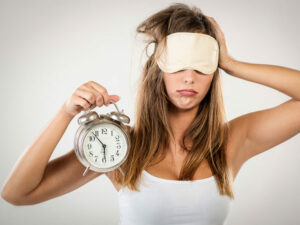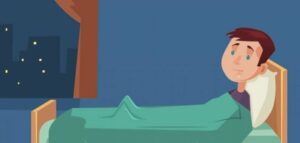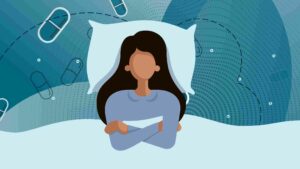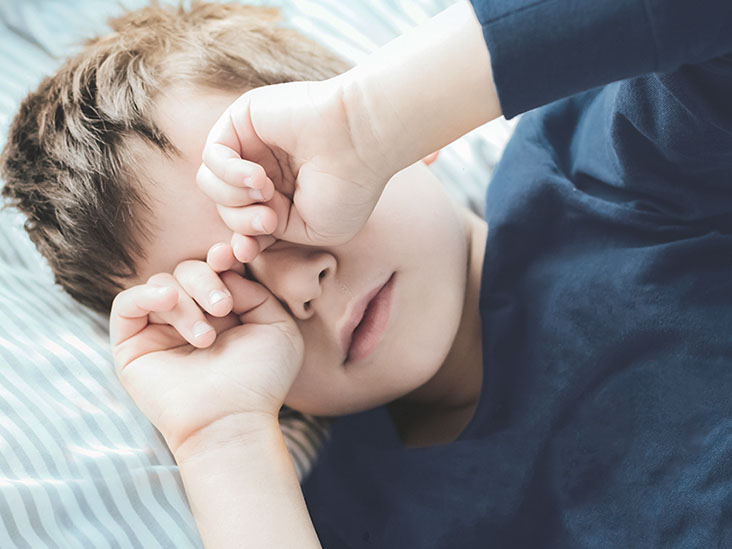Do you have a hard time falling asleep at night? Do you find yourself waking up in the middle of the night and not being able to get back to sleep? If so, you may be suffering from ADHD and insomnia. This is a common problem for people who suffer from ADHD. In this blog post, we will discuss the link between ADHD and insomnia, and we will provide some tips on how to get better sleep.
Contents
Defining ADHD Insomnia
 ADHD insomnia is characterized by difficulty falling asleep, staying asleep, or both. People with ADHD may have trouble falling asleep because their minds are racing or they can’t shut off their thoughts. They may also have difficulty staying asleep because they are easily aroused and have trouble settling back down to sleep.
ADHD insomnia is characterized by difficulty falling asleep, staying asleep, or both. People with ADHD may have trouble falling asleep because their minds are racing or they can’t shut off their thoughts. They may also have difficulty staying asleep because they are easily aroused and have trouble settling back down to sleep.
Although these are two different conditions, they often occur together. In fact, studies have shown that people with ADHD are more likely to also have insomnia than people without ADHD. This is due to the fact that the symptoms of ADHD can make it difficult to fall asleep and stay asleep.
Moreover, ADHD and insomnia can both have a negative impact on your life. For example, if you have difficulty falling asleep, you may not be able to get enough sleep. This can lead to fatigue and make it difficult to focus during the day. So, it is important to be aware of the signs and symptoms of both conditions in order to get the help you need.
Signs and Symptoms of ADHD Insomnia
There are a few different signs and symptoms that may be indicative of ADHD insomnia. Some of these include:
- Trouble falling asleep
- Waking up frequently throughout the night
- Restless sleep
- Early morning waking
- Daytime fatigue
- Difficulty concentrating during the day
- Irritability
- Lack of motivation
These symptoms can be disruptive and make it difficult to function during the day. Moreover, ADHD and insomnia can worsen each other. For example, someone with ADHD may have trouble falling asleep because they are unable to quiet their mind. Then, the next day they may be tired and have difficulty concentrating, which can lead to more problems with sleep the following night.
If you are struggling with any of these, it is important to speak with a doctor or mental health professional. More often, ADHD insomnia is a treatable condition, but you have to seek out help.
What Causes Insomnia In ADHD?
 Insomnia is actually quite common in people with ADHD. It’s estimated that between 30 and 50 percent of adults with ADHD have difficulty falling asleep or staying asleep. There are a few different reasons why this might be the case. These include:
Insomnia is actually quite common in people with ADHD. It’s estimated that between 30 and 50 percent of adults with ADHD have difficulty falling asleep or staying asleep. There are a few different reasons why this might be the case. These include:
- The hyperactivity and impulsivity associated with ADHD can make it hard to wind down at night and fall asleep.
- People with ADHD often have difficulty following through with good sleep habits, like sticking to a regular sleep schedule or avoiding caffeine before bed.
- Many people with ADHD also have other conditions that can contribute to insomnia, such as anxiety or depression.
- It often takes people with ADHD longer to fall asleep than people without the condition. And, they tend to wake up more during the night.
- This can all make for a pretty lousy night’s sleep. Not getting enough rest can impact your mood, energy levels, and ability to focus and concentrate during the day. It can also lead to other health problems.
If you have ADHD and think you might also be dealing with insomnia, talk to your doctor. They can help you figure out what’s going on and come up with a plan to help you get the restful sleep you need.
Moreover, the causes can be environmental such as working the graveyard shift or having a newborn at home. It can also be due to medical conditions like sleep apnea, restless legs syndrome, and thyroid problems. If you have ADHD and any of these cases apply to you, it is important to seek help so that you can get the proper treatment.
However, there are a few things you can do on your own to help improve your sleep. You just need to be patient and be willing to experiment a little bit to find what works best for you.
What Is The Connection Between ADHD And Insomnia?

There is believed to have a strong connection between attention-deficit/hyperactivity disorder (ADHD) and insomnia. It is thought that people with ADHD are more likely to experience difficulty falling asleep and staying asleep than those without the condition.
Further, the connection between the two conditions can be bidirectional. That is, not only can ADHD lead to insomnia, but insomnia can also worsen the symptoms of ADHD. There are a number of reasons why ADHD and insomnia may be connected. For instance:
One theory is that people with ADHD may be more sensitive to stimulation than those without the condition. This can make it difficult for them to fall asleep, as their brain is still active and alert. In addition, some ADHD medications can also cause insomnia. This is because they can contain stimulants that can keep the person awake.
Another reason for the connection between ADHD and insomnia is anxiety and worry. People with ADHD may have difficulty focusing, which can lead to worries about school, work, or other responsibilities. This can make it hard to relax and fall asleep.
Lastly, people with ADHD may also have poor sleep habits. For example, they may stay up late watching television or using their phones. This can lead to a lack of sleep, which can then worsen the symptoms of ADHD.
If you have both ADHD and insomnia, it is important to seek treatment for both conditions. According to studies if you have difficulty sleeping, it can worsen the symptoms of ADHD. It can also lead to other problems, such as fatigue, irritability, and difficulty concentrating.
Treating both conditions can be difficult, but there are a number of things that you can do to help. You just need to be patient and work with your doctor to find the right treatment for you.
What Are The Consequences Of ADHD Insomnia?
 There are many consequences that come along with ADHD insomnia. These can include:
There are many consequences that come along with ADHD insomnia. These can include:
- Difficulty paying attention
- Problems with short-term memory
- Hyperactivity
- Impulsiveness
- Emotional difficulties
- Poor school performance
- Relationship problems
- Irritability
- Sleep problems
These are just some of the ways that ADHD insomnia can cause problems in your life. If you suspect that you may have ADHD insomnia, it is important to talk to a doctor or mental health professional. They will be able to help you get the treatment you need.
In fact, researchers suggest that up to 70% of people with ADHD also have insomnia. This means that if you have ADHD, you are more likely to also have difficulty sleeping. So, it is important to be aware of the signs and symptoms of both disorders and further ask for help.
What Are The Tips To Manage?
When you have ADHD, it can be hard to keep your mind from racing. This can make falling asleep and staying asleep difficult. There are a few things you can do to ease your insomnia and get a better night’s sleep:
Create a bedtime routine
A set bedtime routine will signal to your body that it is time to wind down and prepare for sleep. This can include taking a warm bath, reading a book, or doing some light stretching. Also, routine helps to ease anxiety which can be disruptive to sleep. People also tend to sleep better when they go to bed and wake up at the same time each day. With this, you will be able to set an alarm for a reasonable time and not have to worry about oversleeping.
Avoid caffeine before bed
Caffeine is a stimulant that can make it difficult to fall asleep. If you drink caffeine, try to avoid doing so after lunchtime. Moreover, caffeine isn’t just found in coffee. It is also present in energy drinks, tea, chocolate, and some sodas. In fact, people with ADHD are more sensitive to the effects of caffeine than those without ADHD. For example, if you have trouble sleeping, try decaffeinated coffee or tea instead. So try to avoid caffeine at least six hours before bedtime.
Create a peaceful sleeping environment
Your sleeping environment should be dark, quiet, and cool. This will help your body relax and prepare for sleep. A peaceful sleeping environment is especially important if you have trouble falling asleep. There are several things you can do to create a peaceful sleeping environment, such as using a noise machine or earplugs, using blackout curtains. And keeping the temperature in your bedroom cool.
Use relaxation techniques
 Relaxation techniques can help ease your mind and body into sleep. This can include:
Relaxation techniques can help ease your mind and body into sleep. This can include:
- deep breathing exercises
- progressive muscle relaxation
- visualization
Guided meditation or relaxation tapes can also be helpful. Doing these activities for 20-30 minutes before bed can help you sleep better. Also, some people find that using a body pillow or weighted blanket helps them relax and sleep better.
Limit screen time before bed
The bright light from screens can interfere with your body’s natural sleep rhythm. Try to avoid using electronic devices for at least an hour before bedtime. Also, if you must use a screen before bed, enable the blue light filter. This will help reduce the amount of blue light emitted from the device. For example, on an iPhone, you can enable the “night shift” feature in the display settings. And also, avoid watching television in bed. If you must watch TV, do so in a room other than your bedroom.
Get regular exercise
Exercise can improve your sleep by reducing stress and improving your overall health. However, it is important to avoid exercising too close to bedtime as this can make it difficult to fall asleep. The best time to exercise is in the morning or early afternoon. Because exercise is a stimulant, it can make it difficult to fall asleep if done too close to bedtime. There are various types of exercises that can help improve sleep, you can choose as per your preference.
Eat a healthy diet
This is one of the most important things you can do for your overall health, but it’s especially important if you have ADHD. A healthy diet helps to regulate your mood and energy levels, both of which can be affected by ADHD. There are some essential foods that you must include in your diet if you have ADHD, such as:
- Protein
- Healthy fats
- Complex carbohydrates
- More fibers
- Vitamins and minerals
- Avoid processed foods
Seek professional help
If you feel that your insomnia is impacting your ADHD more than these tips can help, it may be time to seek professional help. A sleep specialist can help you identify the underlying cause of your insomnia and develop a treatment plan. Insomnia can be caused by many different things, so it is important to get an accurate diagnosis. Treatment for insomnia often includes behavioral therapy and/or medication.
Also, ADHD is often treated with medication. If you are taking medication for ADHD, be sure to talk to your doctor about any potential side effects that could impact your sleep. Some ADHD medications can cause insomnia while others can improve sleep. It is important to find the right balance for you.
Conclusion
Conclusively, ADHD insomnia is a real thing. It’s important to be aware of the symptoms and how they might be affecting you. If you think you might have ADHD, speak with a mental health professional to get a proper diagnosis. Treatment for ADHD can help improve your quality of life significantly.
Moreover, you should also know that you’re not alone in this. Many people with ADHD struggle with insomnia. But the good news is that there are things you can do to ease your symptoms. With a little help, you can get a better night’s sleep and feel more rested during the day.
For more information, please contact MantraCare. ADHD is a neurodevelopmental disorder characterized by difficulty in paying attention, hyperactivity, and impulsivity. If you have any queries regarding Online ADHD Counseling experienced therapists at MantraCare can help: Book a trial ADHD therapy session


